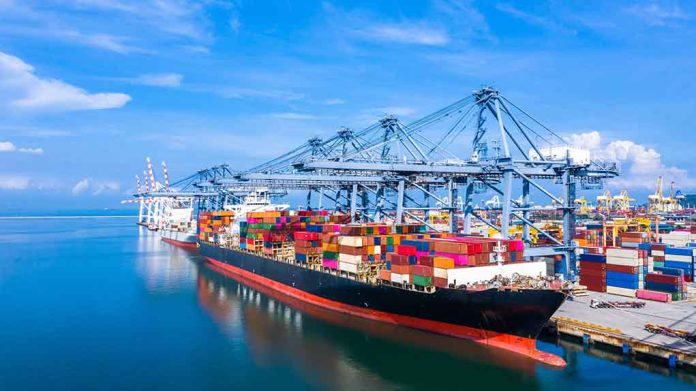
House Republicans propose a bill to ban Chinese companies from U.S. ports, citing national security concerns and the need to protect critical infrastructure from foreign influence.
At a Glance
- GOP Rep. Michelle Steel introduces the Secure Our Ports Act to block access for companies from China and other adversary nations
- Bill targets firms owned by state enterprises in China, Russia, North Korea, and Iran
- Legislation aims to safeguard U.S. supply chains and national security
- Concerns raised about Chinese equipment and cranes potentially being used for surveillance
Proposed Legislation to Secure U.S. Ports
House Republicans are taking decisive action to protect America’s critical infrastructure by proposing legislation that would prevent Chinese companies from operating in U.S. ports. Rep. Michelle Steel, a member of the House Select Committee on Communist China, is spearheading the effort with the introduction of the Secure Our Ports Act. This bill aims to block access to U.S. ports for companies fully or partially owned by state enterprises from China, Russia, North Korea, and Iran.
The legislation comes in response to growing concerns about national security and the potential for foreign influence over crucial trade locations. Steel, whose home region of Southern California hosts two of the largest U.S. ports – the Port of Los Angeles and the Port of Long Beach – emphasized the importance of this measure.
House GOP rolling out bill to block China from accessing US ports https://t.co/aBlIaOvTdc
— Fox News (@FoxNews) September 13, 2024
National Security Implications
The push for this legislation follows warnings from national security and defense officials about the potential risks associated with Chinese equipment and cranes at U.S. ports. There are concerns that such equipment could be used for surveillance purposes, compromising sensitive information and operations.
Multiple China-owned conglomerates, such as COSCO and COFCO, currently have a presence in American ports. The proposed bill seeks to address this issue by preventing such companies from accessing U.S. shipping infrastructure, thereby protecting supply chains and national security interests.
Bipartisan Support and Additional Measures
The Secure Our Ports Act has garnered support from both sides of the aisle, with co-sponsors including Reps. Stephanie Bice, Ken Calvert, Rick Crawford, Richard Hudson, Doug LaMalfa, Nicole Malliotakis, James Moylan, Aumua Amata Coleman Radewagen, John Rutherford, and Randy Weber. This bipartisan backing underscores the widespread recognition of the potential threats posed by foreign influence in critical infrastructure.
In addition to the Secure Our Ports Act, Congress has recently passed legislation banning the Pentagon from using any seaport that relies on the Chinese logistics platform LOGINK. This platform, which tracks cargo and ship movements, has raised concerns about Beijing’s ability to monitor America’s military supply chain. The ban, which will take effect six months after President Joe Biden signs the bill, also prohibits federal funding for any port using LOGINK.
Looking Ahead
As the United States continues to navigate complex relationships with global powers, particularly China, measures like the Secure Our Ports Act represent a proactive approach to safeguarding national interests. The bill’s supporters argue that it would shore up America’s economic and national security in the face of threats from adversary nations.
While the legislation is still in its early stages, it signals a growing awareness of the need to protect critical infrastructure from potential foreign influence. As the bill moves through the legislative process, it is likely to spark further debate on the balance between international trade and national security concerns.





